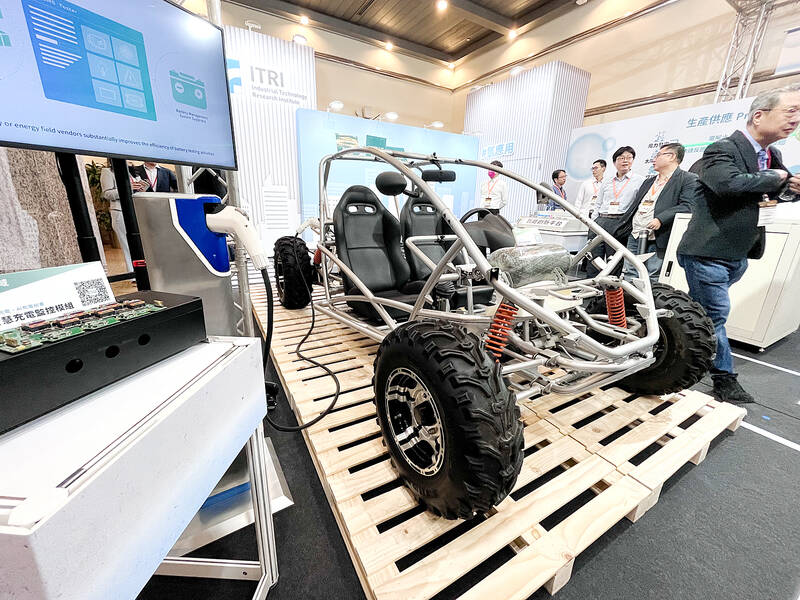Taiwan’s manufacturing output last quarter rose 14.09 percent from a year earlier to NT$4.81 trillion (US$150.17 billion), as local tech firms benefited from avid demand for electronics used for artificial intelligence (AI), high-performance computing and cloud data centers, the Ministry of Economic Affairs said yesterday.
The increase also had to do with some non-tech sectors completing inventory adjustments and a low comparison base in the second quarter of last year, the ministry said in a report.
The manufacturing industry carries heavy weight in the nation’s export-oriented economy, as Taiwan is home to the world’s major suppliers of advanced chips, AI servers, storage and memory, among other products.

Photo: CNA
Computer electronics and optical devices posted the biggest increase of 56.89 percent to reach a new quarterly record of NT$410.5 billion, due to the AI frenzy and restocking demand from smartphone brands, the ministry said.
Taiwanese firms are responsible for making camera lenses for Apple Inc’s iPhone series and other global smartphone brands.
Overall output of electronic components totaled NT$1.52 trillion during the April-to-June period, increasing 24.82 percent from a quarter earlier, the ministry said.
Semiconductors grew 37.71 percent to NT$970.7 billion, the sector’s best showing in history, as the AI boom buoyed demand for 12-inch wafers, the ministry said, adding that chip designers and memory product makers also benefited from a windfall.
In contrast, flat panels and related devices were still affected by tepid end-market demand, and their output declined 5.29 percent year-on-year to NT$127.6 billion, it said.
The retreat coincided with lackluster TV and notebook computer sales.
In the non-tech sectors, business picked up modestly, the ministry said.
Industrial output of chemical and fertilizer products grew 11.13 percent, while the base metal sector posted a 6.82 percent increase, it said.
Machinery equipment suppliers reported 4.2 percent growth, attributable to improving demand from semiconductor firms, the ministry said.
Local semiconductor firms are displaying more interest in expanding capacity to meet fast-growing demand for AI-related products from US customers.
Business from China, Taiwan’s largest export destination, has subdued, consistent with the market’s below-par economic performance, government data showed.
Industrial output of auto parts dropped 4.26 percent, as sales of fuel-powered vehicles came under increasing pressure from electronic vehicles, the ministry said, adding that competition from abroad negatively affected business orders.
The US’ restrictive monetary policy looks unfavorable for global trade, as does lingering US-China competition in the technology sector and geopolitical military conflicts, the ministry said.
Fortunately, US technology giants are pouring money into AI development, which is improving business for local firms in their supply chains, it said.

Nvidia Corp CEO Jensen Huang (黃仁勳) today announced that his company has selected "Beitou Shilin" in Taipei for its new Taiwan office, called Nvidia Constellation, putting an end to months of speculation. Industry sources have said that the tech giant has been eyeing the Beitou Shilin Science Park as the site of its new overseas headquarters, and speculated that the new headquarters would be built on two plots of land designated as "T17" and "T18," which span 3.89 hectares in the park. "I think it's time for us to reveal one of the largest products we've ever built," Huang said near the

China yesterday announced anti-dumping duties as high as 74.9 percent on imports of polyoxymethylene (POM) copolymers, a type of engineering plastic, from Taiwan, the US, the EU and Japan. The Chinese Ministry of Commerce’s findings conclude a probe launched in May last year, shortly after the US sharply increased tariffs on Chinese electric vehicles, computer chips and other imports. POM copolymers can partially replace metals such as copper and zinc, and have various applications, including in auto parts, electronics and medical equipment, the Chinese ministry has said. In January, it said initial investigations had determined that dumping was taking place, and implemented preliminary

Intel Corp yesterday reinforced its determination to strengthen its partnerships with Taiwan’s ecosystem partners including original-electronic-manufacturing (OEM) companies such as Hon Hai Precision Industry Co (鴻海精密) and chipmaker United Microelectronics Corp (UMC, 聯電). “Tonight marks a new beginning. We renew our new partnership with Taiwan ecosystem,” Intel new chief executive officer Tan Lip-bu (陳立武) said at a dinner with representatives from the company’s local partners, celebrating the 40th anniversary of the US chip giant’s presence in Taiwan. Tan took the reins at Intel six weeks ago aiming to reform the chipmaker and revive its past glory. This is the first time Tan

CUSTOMERS’ BURDEN: TSMC already has operations in the US and is a foundry, so any tariff increase would mostly affect US customers, not the company, the minister said Taiwanese manufacturers are “not afraid” of US tariffs, but are concerned about being affected more heavily than regional economic competitors Japan and South Korea, Minister of Economic Affairs J.W. Kuo (郭智輝) said. “Taiwan has many advantages that other countries do not have, the most notable of which is its semiconductor ecosystem,” Kuo said. The US “must rely on Taiwan” to boost its microchip manufacturing capacities, Kuo said in an interview ahead of his one-year anniversary in office tomorrow. Taiwan has submitted a position paper under Section 232 of the US Trade Expansion Act to explain the “complementary relationship” between Taiwan and the US